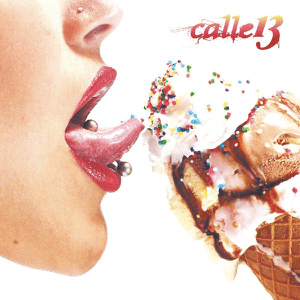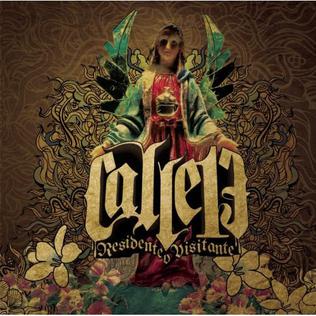
Calle 13 is a Puerto Rican alternative hip-hop band formed by stepbrothers Residente and Visitante, along with their half-sister iLe, also known as PG-13.

Calle 13 is the debut studio album by Puerto Rican urban/hip hop band Calle 13, released on November 29, 2005, by White Lion Records. The album was recorded in the wake of the group's online success with the song "Querido FBI". The album received positive reviews, with critics praising Residente's lyrical style and the musical diversity displayed on the record.

Residente o Visitante is the second studio album by Puerto Rican urban/hip hop band Calle 13, released on April 24, 2007, by Sony BMG. Recorded in various countries while on tour in promotion of the duo's debut album Calle 13, Residente o Visitante marked an evolution in the band's musical and lyrical style. While writing the album, the duo took a trip to South America to explore areas populated by Latin America's indigenous and African-descended minorities, a journey that greatly influenced the music on Residente o Visitante. The album features six guest artists and delves into genres such as tango, bossa nova, cumbia, and electronica.

"Tango del Pecado" is the first single from Calle 13's second album, Residente o Visitante. The song features Bajofondo & Panasuyo and was released on iTunes via digital download on March 27, 2007.

Sentimiento is the sixth studio album by Puerto Rican recording artist Ivy Queen. It was released on March 27, 2007, by Univision Records. The album features production collaborations with several Puerto Rican music producers including Monserrate & DJ Urba, Noriega, and Luny Tunes. It also features vocal collaborations with Don Omar, Arcángel, Tito "El Bambino", Ken-Y, Randy and Naldo. The album includes solo performances by Baby Rasta, Divino, Mikey Perfecto, Naldo and Noriega. Musically, the album alternates between reggaetón, bolero, and salsa. The move in musical composition from reggaetón and hip hop is credited to Queen's evolution as a musical artist.

Los de atrás vienen conmigo is the third studio album by Puerto Rican alternative hip hop band Calle 13 and was released on October 21, 2008, by Sony Music Latin. This album is a bit more colorful than the previous, although dark humor continues to be the tone. The album has a fusion of rhythms the band discovered during their visits to several countries. They fuse rhythms of 'cumbia villera' native to Argentina, and rhythms of Balkan music. The album features collaborations with Rubén Blades, Café Tacuba, and Afrobeta. It won Best Latin Rock, Alternative or Urban Album at the 52nd Annual Grammy Awards and five Latin Grammys including Album of the Year at the 10th Annual Latin Grammy Awards.

"El Amor" is a song by Puerto Rican singer Tito El Bambino. It was composed by Tito and Joan Ortiz and released on February 9, 2009, as the second single from his third studio album, El Patrón (2009). The song blends the sounds of Latin pop with cumbia and merengue. A regional Mexican and a salsa version were recorded and included on the special edition of the album.

René Pérez Joglar, known professionally as Residente, is a Puerto Rican rapper, singer, songwriter and filmmaker. He is best known as one of the founders of the alternative rap band Calle 13. Residente released five albums with Calle 13 before announcing his solo career in 2015. Residente released his debut solo album in 2017. He has won four Grammy Awards and 28 Latin Grammy Awards—more than any other Latin artist. Residente has also delved into producing documentaries including Sin Mapa (2009) and Residente (2017) and has directed some of his own music videos.

Eduardo José Cabra Martínez, better known by his stage name "Visitante Calle 13", "Visitante", or more recently, "Cabra", is a Puerto Rican producer, musician, composer, and multi-instrumentalist. He rose to fame due to the Puerto Rican band Calle 13, which he co-founded with his step brother René Pérez Joglar ("Residente").
Throughout the thirteen-year history of the Latin Grammy Awards, multiple records have been set. This page includes competitive awards only and does not include special awards such as Lifetime Achievement awards or any other non-competitive awards presented by the Latin Academy of Recording Arts & Sciences.
James Cruz is a Grammy Award winning audio mastering engineer and owner of Zeitgeist Sound Studios in Long Island City, New York.
"Latinoamérica" is a song by Puerto Rican alternative hip hop band Calle 13. It was released on September 27, 2011 as the fifth single from their fourth studio album, Entren Los Que Quieran (2010). It was written and produced by Rafael Arcaute and Calle 13, and features additional vocals from other Latinoamerican recording artists. These artists include Peruvian Susana Baca, Colombian Totó la Momposina and Brazilian Maria Rita. The song won Record of the Year and Song of the Year in the Latin Grammy Awards of 2011. The song is important in that it touches on many underlying historical, social, and political themes present throughout Latin America.
Israel Lugo is an American actor, director and Latin Grammy Award-winner music video director. Lugo was born in Brooklyn, New York and has credits for directing the documentary Sonó, Sonó, Tité Curet!!! (2011) and for acting on Mi Dia de Suerte, The Apostate, El Clown and Che. Also he is known for his work with Gabriel Coss directing music videos for Calle 13, Nelly Furtado, Maná and Paulina Rubio, among others.
Gabriel Coss is a Latin Grammy Award and a Regional Emmy Award-winner music video director. Coss also has credits for directing the documentaries Aljuriya (2004), Sonó, Sonó, Tité Curet!!! (2011) and Armonía. In 2005, Coss launched 939 Films with Israel Lugo, which they merged with Rojo Chiringa Films in 2007.
Alejandro Santiago Ciena was a Latin Grammy Award-winner music video director. He was the director of the production company Crema Batida Films, and also has credits as a second unit director for the Puerto-Rican film Manuela y Manuel (2007). Santiago Ciena was best known for his work directing music videos for the Puerto-Rican band Calle 13; Santiago Ciena was the cousin of René Pérez (Residente), the band's lead singer. The first video he directed for the band was "Calma Pueblo", the lead single of Entren Los Que Quieran in 2010. The video presented Calle 13 as terrorists dressed as nuns and was deemed as "violent" by Judy Cantor-Navas of Billboard magazine. Santiago Ciena, commented about the concept of the video, which uses nudity as a representation of freedom: "We wanted the lyrics and the visuals to be strong... we wanted it to be real, but still have a positive message to the show the union of people who fight to produce art." The video was recorded in Milla de Oro, San Juan, Puerto Rico, and was intended as a tribute to the work of American photographer Spencer Tunick. Calle 13 and Santiago received the Latin Grammy Award for Best Short Form Music Video for "Calma Pueblo".
The Entren Los Que Quieran Tour is an international tour by Puerto Rican group Calle 13 in support of the band's 2010 release, Entren Los Que Quieran.

Multi_Viral is the fifth and final studio album from Puerto Rican band Calle 13, released on March 1, 2014. It marks the band's debut release via their new independent label, El Abismo, since they parted ways with Sony Music Latin. The album won Best Urban Music Album at the 15th Annual Latin Grammy Awards and Best Latin Rock or Alternative Album at 57th Annual Grammy Awards.

This is a list of notable events in Latin music that took place in 2011.
Edgardo Matta, professionally known as Mattatracks, is a two-time GRAMMY and a six-time Latin GRAMMY award-winning record producer, composer, and songwriter.











